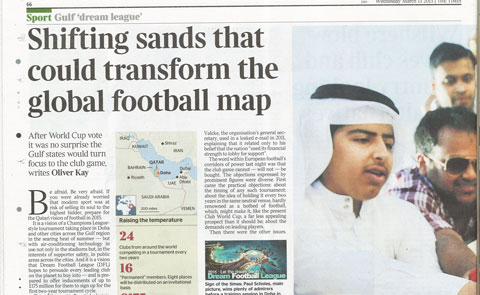During the night of March 11 a French football magazine -- le Cahiers du Football -- published a spoof story about how the Qataris we going to start a new football competition - the Dream Football League. The story was "completely made up."
Less than 24 hours later this happened:
The Times publishes exclusive information weirdly similar. Name of the project, date of launching, number of clubs participating (even on invitation), spending limits, and the same picture. An almost perfect match. Except that everyone in England is yet to realize that.
Shortly after the publication of the article, other British papers run the story. Opinion pieces on the topic appear and English-speaking journalists talk with each other on Twitter, saddened by the possibility of such a project. They are quickly warned by the usual Cahiers readers, especially by us, Christophe and Raphaël, who write on les Dé-Managers, a blog associated with Les Cahiers. We tell them that their exclusive is actually based on an entirely fictional article. At that moment, few of them take us seriously.To make matters even more interesting the journalist who broke the story in the Times -- the widely respected Oliver Kay -- not only stood by his reporting but fired back strongly at le Cahiers du Football and others who pointed out that key details in his story appeared a day earlier in the spoof, such as in the Twitter exchange below.
@rue89sport Nice try. Except that @cahiersdufoot was 100% NOT the source of my story, as I suspect Cahiers (with their "DFL" imagery) knowIt is unclear exactly what happened here. Some facts are clear -- The Qataris have denied the story. It is fairly obvious even with my rusty French that the story appeared first on le Cahiers du Football. The story is a spoof. Oliver Kay denies that and has even followed up his original report with a new story focused on Manchester United's opposition to the imaginary new league. Did a widely respected journalist get taken in by a dodgy source? Something else? Can't say right now. But of course, getting to the bottom of things is an important reason why we have journalists, right?
— Oliver Kay (@OliverKayTimes) March 13, 2013
Maybe not. Consider ESPN which unwisely says that le Cahiers du Foot is wrong and runs with the story:
Kay is the antithesis of that unfair caricature of a headline-hungry, fact-resistant English newspaper journalist. He's intelligent, diligent, cautious and rarely given to hyperbole. Doubting him would be unwise.One of the things that I try to teach my students is that accepting arguments from authority at face value is not good for them or the authorities. There is nothing wrong with exploring and verifying claims. Writing at Counter Attack Richard Whittall explains well that it actually matters what has gone on here:
Whatever the outcome, this story should not be buried. None of the major papers seem to be including some recent details. Fair enough; they’re all pretty inconclusive on their own right. But it does involve the credibility of a major UK newspaper, the reputation of an established journalist, and the viability of unnamed sources. This doesn’t have to be some sort of journalistic “lesson,” but maybe a warning for those getting information that sometimes seems to good to be true.At Play the Game earlier this week, ironically enough, David Rowe asked "What is sports journalism for?" and offers up a hard-hitting critque of the profession:
[T]he section of the media dedicated to informing us about it – sports journalists – are looking more than a little dishevelled. The ABC’s Clarke and Dawe lampooned the discipline last week, with Clarke’s “expert sports journalist”, responding to a “release form” question about silence or incompetence, with the answer: “I just get stuff off the internet and stick it in the paper”.How Oliver Kay, The Times and the broader sports media that has been taken in by a story that is not quite right follow up on the Dream Football League "exclusive" will tell us a lot about the state of the profession. After all, if journalists can't be trusted to take care of their own profession, how can they be trusted to look into match fixing, doping and broad failures of governance in sport?
This comic turn raised an important question – what is sports journalism for? Is it reasonable to describe the sports desk as “the toy department of the news media”? Are its journalists part of the fourth estate or simply a fan club?
Sports journalists, it’s fair to say, do not have elevated reputations among (also much-disparaged) fellow reporters on other rounds. That attitude might stem from professional jealousy of the “nice work if you can get it” kind, and also because sport tends to be patronised as “just” popular culture. Nonetheless, sports journalists have found it hard to shake their unfavourable image as middle-aged men billowing smoke and swilling beer, as star-struck sport wannabes playing at being serious scribes.
This cruel stereotype ought to be outmoded as the demographics of sports journalism change, and better educated younger people move into the game, including more women breaking into the locker room. A university education should raise the bar, replacing tunnel vision and back-slapping with critical and investigative sports journalism.



Quite. Regrettably, the cult of the God-like journalist is thriving. The subtle closing of ranks around the Oliver Kay case is symptomatic of a profession (journalism) that is not adverse to mimicking the sort of political mores it so often excoriates. More accountability would not go amiss. In politics, as in journalism. Kevin Quigagne.
ReplyDelete